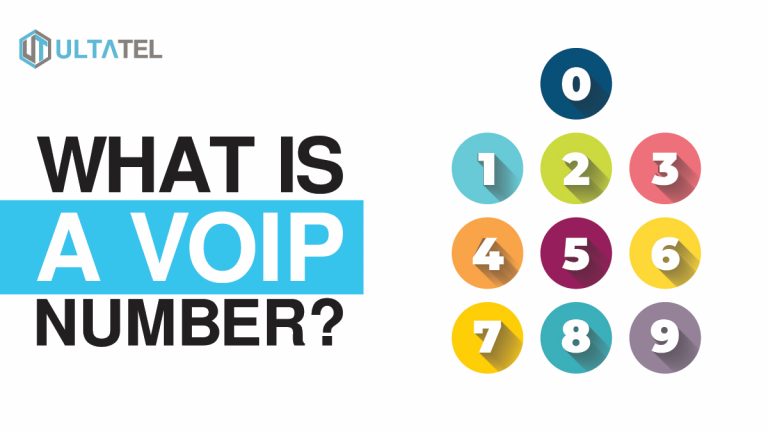If you’re a traditional phone number user looking for a more flexible plan, you might consider a VoIP number. These flexible multi-use numbers are easy to install, have impressive features, and are more cost-effective than their conventional counterparts.
Whether you’re a freelancer, business owner or are simply seeking a more adaptable line of communication, VoIP numbers provide unbeatable advantages. Learn more about how VoIP numbers work, their benefits, and how to get one.
What is a VoIP Number?
A VoIP number, also known as a Voice over Internet Protocol number or virtual number, is a telephone number that allows voice calls to be made over the Internet rather than through traditional phone lines. VoIP technology converts voice signals into digital data packets and transmits them over an IP network like the Internet. With a VoIP number, users can make and receive calls using their internet connection instead of traditional phone service. VoIP numbers are compatible with smartphones, computers, and dedicated VoIP phones.
How Do VoIP Phone Numbers Work?
VoIP numbers transmit calls over an IP network. Here’s a quick rundown of how it functions:
A user signs up for a VoIP number through a service provider. When you make a phone call using a VoIP phone, your voice is captured by a microphone and converted into digital audio data through analog-to-digital conversion.
The digital voice data is then divided into small packets or chunks, including the voice data and additional information, such as the source and destination IP addresses. The packets travel through an IP network (public or private).
The packets may take different routes to reach their destination and occasionally arrive out of order. However, they are reassembled in the correct order at the receiving end based on the information included in the packets.
Once the packets reach the destination, they convert into analog audio signals. The converted analog voice is then delivered to the recipient’s phone or device, allowing them to hear the call as a regular “telephone-like” conversation.
Advantages of VoIP Phone Numbers
VoIP phone numbers provide significant advantages that conventional phone numbers can’t. If you’re keen on requesting a VoIP number from a service provider, below are a few reasons to jump the gun:
- It’s cost-effective: VoIP phone systems often provide significant cost savings as they are typically more affordable, especially for long-distance or international calls.
- It’s usable anywhere: Because VoIP numbers aren’t tied to a specific location, you can use them anywhere, even internationally.
- It’s scalable: Do you need to add or remove a phone line? You can easily do so in a few minutes with a VoIP number, enabling businesses to accommodate quick changes.
- It has advanced features: Unlike traditional phone numbers, VoIP numbers can accommodate more advanced features like call forwarding, recording, voicemail, virtual extensions, conference calls, etc.
- It’s easy to integrate: You can incorporate your VoIP number with a single click if you run other software communication applications.
- It’s easy to set up: No more waiting hours for a service provider to hook your device up to a phone line—with a VoIP number, you can quickly set up your system online.
- It’s compatible with multiple devices: If you’re a multitasker, you’ll be pleased to know that VoIP numbers can make calls through multiple devices like smartphones and laptops.
VoIP Phone Numbers vs. Regular Phone Numbers
The main difference between VoIP phone numbers and regular phone numbers lies in the underlying technology used for communication.
Regular phone numbers are associated with traditional landline or mobile telephone systems. These systems utilize the Public Switched Telephone Network (PSTN), which is a circuit-switched network. When you make a call using a regular phone number, your voice is converted into electrical signals and transmitted over physical copper wires or wireless networks. Regular phone numbers are typically assigned by telecommunications companies and are tied to specific geographical locations.
VoIP numbers, on the other hand, are assigned to devices or software that utilize internet connections to transmit voice data. VoIP technology converts analog voice signals into digital packets and sends them over the internet. These numbers are not tied to physical locations and can be used from anywhere with an internet connection. VoIP phone numbers are often associated with virtual phone systems, softphone applications, or VoIP service providers.
Type of VoIP Phone Numbers
Did you know that there is more than one type of VoIP number? These types provide various benefits and serve different purposes.
Local Numbers
Geographic or local VoIP numbers are associated with specific geographic locations and typically have the same area or country code as the location. These numbers allow businesses or individuals to establish a local presence in a particular area without physically being located there. For example, a firm based in New York could have a VoIP number with a New York area code even if its physical office is in a different location.
Toll-Free Numbers
The number one deterrent to customer service calls is the possibility of an unwanted surcharge—a problem toll-free numbers can fix. If your customers need to contact you regularly, employing a toll-free VoIP number eliminates calling fees, giving your business more credibility.
Vanity Numbers
Vanity VoIP numbers are customized numbers that spell out a word or phrase on a telephone keypad. For example, a business selling flowers may use a vanity number like 1-800-FLOWERS. Vanity numbers are an excellent marketing tactic, making your contact details easy to remember.
How to Get a VoIP Phone Number
A VoIP number begins with a service plan. Follow these steps to obtain your VoIP number:
- Choose a VoIP service provider: Research and select a reputable VoIP service provider that offers the features and services you require. Numerous providers are available for businesses and individuals, so compare their offerings, pricing plans, call quality, customer support, and any additional features or integrations they provide. With providers like ULTATEL, you can get accurate quotes by filling up an information form.
- Sign up for an account: Visit the website of the chosen VoIP service provider and sign up for an account, inputting your contact information and other details.
- Choose a phone number: During sign-up, you will typically be prompted to select a VoIP number. Depending on the provider, you can choose from various types of numbers, such as geographic, non-geographic, virtual, or international numbers.
- Configure your account: Once you have chosen a VoIP number, you must configure your account settings and features like call routing, voicemail, forwarding, or otherwise.
- Set up soft/hardware: You may need specific hardware or software (IP phones, softphone apps, etc.) to use the VoIP number, depending on your chosen VoIP service provider.
- Test your VoIP number: After the initial setup, you can start using your VoIP number to make and receive calls.
VoIP Phone Number FAQs
Who uses VoIP phone numbers?
VoIP phone numbers are commonly used among businesses, call centers, international firms, travelers, non-profit organizations, and virtually all individuals that require flexible communication.
How do you identify if a caller is using a VoIP phone number?
While it may require some investigation, you can identify if a caller uses a VoIP phone number through caller ID information, online number lookup services, caller behavior, and the number’s service provider.
Are VoIP numbers safe to use?
VoIP numbers are safe to use but occasionally fall victim to phone scams. You can protect against phone scams by changing your login details regularly, avoiding calling numbers from unsolicited emails, and refusing to provide confidential information.
How much is a VoIP phone number?
VoIP phone numbers can cost between $100 and $400 per extension.
Can I use my existing phone number as my VoIP number?
You can use your existing phone number as your VoIP number if your service provider supports porting. Porting enables users to transfer numbers from traditional calling services into VoIP systems.
Can VoIP numbers make international calls?
VoIP numbers can make international calls more cost-effectively than traditional phone lines.
Summary
Thanks to their numerous advantages over traditional phone lines, VoIP numbers are becoming increasingly popular among all users. They leverage the power of Voice over Internet Protocol technology to transmit voice calls over IP networks, such as the Internet. VoIP numbers are the way to go when it comes to cost savings, flexibility, scalability, and advanced features that enhance communication.

